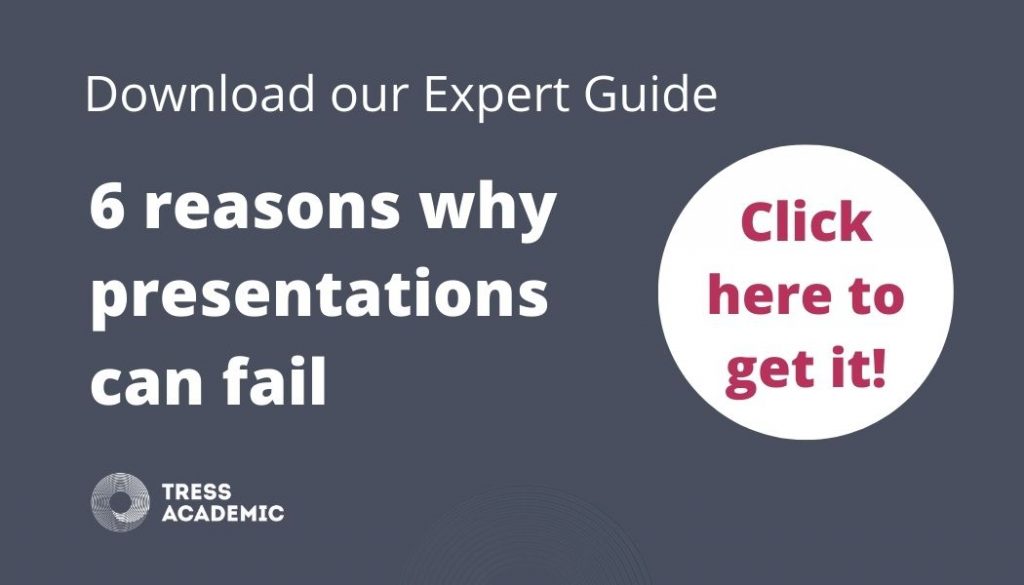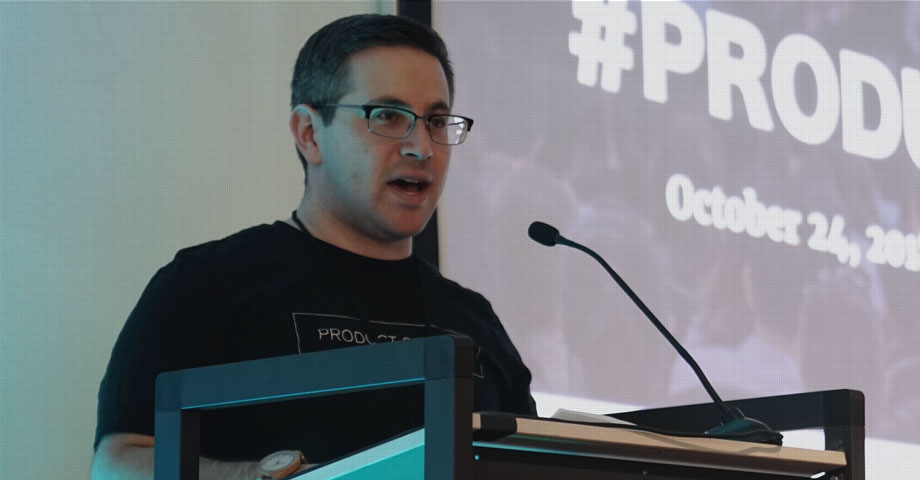You can never know the exact questions that the audience will ask after you have finished a conference presentation. This uncertainty can cause additional stress for you, and put you on edge during your presentation. There are, however, a few questions you can assume that someone from your audience might ask. So why not prepare yourself for these questions just in case? We’ll tell you which type of questions these are, and how you can easily prepare yourself for them. Having answers ready for these standard questions will make the Q&A part so much easier for you and alleviate unnecessary stress on the big day.
When we recently held our course “How to present at international scientific conferences” at a Swiss university, we discussed the Q&A part that comes right after a conference presentation with the participants. They spoke about their experiences at conferences where they presented their research, and everything that made it especially difficult for them. The presentations were always a big cause of stress and anxiety for them – is it for you as well? If so, we have another post from the Smart Academics Blog that will help you to deal with being nervous, see #3: “How to cope with stage fright?”.
If you are not an experienced presenter, it is a pretty big thing to go out and stand in front of a large crowd of colleagues from your field and tell them about your work. What our course participants were most scared of – even more than giving the talk – was the moment after they had delivered their presentation and the session chair opened the floor for questions. This was the moment where the unexpected could happen because they didn’t know what the questions would be. The biggest fear in the moment was to receive questions that they cannot answer or that make them look inexperienced, ignorant or worse!
We totally understand this fear. Imagine you were well-prepared for a talk and had a good feeling throughout the presentation, but the questions from the audience could spoil the good impression. Just imagine if you would have no idea how to answer relatively simple questions – this would be a waste of!
Do you have the same fears? We’d love to help you overcome them! There are actually a handful of questions that are very likely to be asked. These are the type of questions that so often come up at conferences, especially when early-career researchers are presenting. You should be prepared for these questions, with an answer in hand, which is not difficult to do! It should be a part of your preparation for the conference talk to think about these questions. You will see, it takes a lot of stress off your shoulders!
Let us tell you about the most common audience questions at conferences below. If you want to prepare yourself for the next talk, download our free worksheet “Questions I should be ready to answer”.
Typical audience questions you should have an answer for
1. What’s next …?
Of all the questions that people from the audience could ask you, this is for sure one of the most friendly and helpful ones. This question offers no critique of your work, and it does not ask for clarification of anything you said in your talk. The questioner simply wants to know what your next research steps are. They are interested in your research and express curiosity of how it might go on.
So, make sure you have an idea about which follow-up steps you want to take with your research. Be prepared to tell the audience a little bit about how you might progress. Think about what you want to say before the question is asked and make a structure of the points you want to say, so you don’t leave out anything important. Use our free worksheet “Questions I should be ready to answer” to help you.
2. Why should we know more about this?
If you hear this question right after finishing your talk, you might feel a bit frustrated, or even threatened. Why is the audience asking this at the end? Wasn’t your talk clear enough? Have they not listened to you? It can sound as if the questioner doubts the value or necessity of your work. Or it could feel as if you were not clear enough when describing why you research what you do.
In fact, this is again a very friendly and helpful question. It has no negative connotation and the questioner has no intention of criticising you or your work. He or she may just want to know more explicitly from you why you did this research and why it is worth doing in such detail. It is a question about the relevance of your work.
So, what do you do? Tell the audience why you did your research, what you expect as its outcome and give some examples or applications to help them better understand why your work is needed. Use our free worksheet “Questions I should be ready to answer”.
3. How have you done this …?
This is a question about your methods or the overall approach you’ve applied. You will probably be surprised to get this question because you’ll think you had explained everything very clearly in your talk. Obviously, this was not the case for the person asking.
Don’t be scared! You have most likely not failed to talk about your methods, but in presentations, the reporting on the scientific methods that were applied to address a certain question is often the most difficult part for the audience to comprehend. Thus, it is not surprising that questions arise on the matter.
Properly describing the methods you applied in your research in a conference presentation is challenging. You hardly have the time to go into such detail in order to make the audience fully understand it. In a typical 15-minute presentation slot, which requires time for questions and discussion, so it is really more like a 10-12 minute talk, you have only a few minutes available to explain your approach.
For this reason, we advise participants in our courses to always keep the methods part of your presentation short, by reducing it to the main steps and avoiding too much detail. You should give only a rough outline of the steps because it is difficult, tiring, and sometimes also a bit boring for the audience to listen to a specific set-up of a workflow or a project when you have not been part of the project.
Instead, spend time in your talk presenting your problem, your findings, your examples, and your take-home message. This is what the audience needs to understand! But of course, it might then trigger a question about HOW have you done it, which again, you can prepare yourself for. It is really a friendly and helpful question from an interested person. The audience shows that they want to better understand how your work was done.
In your preparation phase, determine which methods or method steps could be unclear to your audience and what kind of information they would need to have for a quick understanding of a complex issue. Use our free worksheet “Questions I should be ready to answer” to help you prepare for this step.
4. What do you mean by …?
The fourth most common question that you can expect to receive is probably the easiest one to answer. It is a clarifying question where the questioner has not understood a specific term, a process, or an aspect of your presentation that you referred to.
Questions like this pose no threat but are necessary for your audience to fully get your talk. Don’t forget, you will also have some listeners in your audience that come from other fields and they might not be familiar with your specialist terminology. We can never know what the exact level of knowledge of our audience is, therefore, you will sometimes be surprised to get questions about aspects you think are common knowledge – they probably are not.
If you follow our rule to only include what you can explain yourself in your presentation, you will never have a problem with this question. If you fully comprehend what you talk about, you will always be able to address this question professionally. If you try to illustrate your vast knowledge by alluding to processes that you do not fully comprehend, you run the risk of not being able to further explain to them when asked by the audience. Keep your presentation air-tight to what you know you know!
You can prepare yourself with an overview of topics and aspects that probably somebody in the audience who isn’t from your field wouldn’t know and potentially need a clear explanation. Our free worksheet “Questions I should be ready to answer” will help you to prepare for this.

Conclusion
Naturally, the Q&A part of a conference presentation is the part that you can’t prepare for as precisely as the actual delivery of your presentation. There will always be an element of surprise for you and this is of course also the purpose of this interaction with the audience. They want to experience you off the cuff, where you have to show a bit of spontaneity. They are not coming to see a well-rehearsed play, but a glimpse of the scientists who are conducting this cutting edge work.
That does not mean everything taking place during the Q&A is random and you have to give yourself over to fate. An audience can feel when you are nervous and they feel for you when you are a less-experienced presenter. Therefore, they sometimes deliberately ask some of the questions above, because they know these are ‘soft-ball’ questions that you can answer. So, make sure you are prepared for them and show your audience that you have done the work and deserve their attention. We wish you best of luck with your next Q&A session!
Relevant resources:
- Worksheet “Questions, I should be ready to answer”
- Presentations course “How to present at international scientific conferences”
- Smart Academics Blog #03: How to cope with stage fright?
- Smart Academics Blog #24: New to the PhD? – 5 tips for a great start!
- Smart Academics Blog #26: First conference presentation? 17 life-saving tips
- Smart Academics Blog #95: Apply these 5 tips to improve any presentation
Relevant courses and services:
- 1-day course: Presenting successfully at virtual conferences
- 3-day course: How to present at international conferences
- 1-to-1 advice: Presentation Check
More information:
Do you want to present successfully at conferences?
If so, please sign up to receive our free guides.
© 2019 Tress Academic
#ConferencePresentations #ConferenceTalk #QA #QuestionsAndAnswers, #AudienceQuestions
